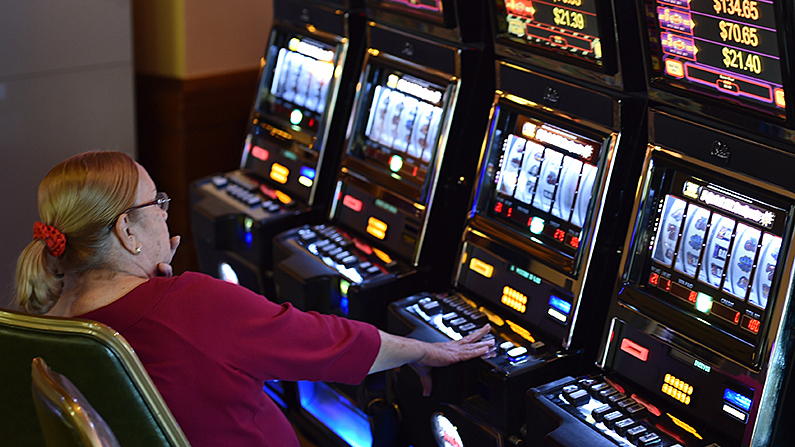An Arizona man has spent six months trying to get what he claims is a $50,000 payoff he won on a slot machine.
The casino claims the machine was broken and the $4,000 it actually paid out is correct—and all the man will ever get.
One day in April, Ryan Sherry stopped by the Talking Stick Resort and Casino Scottsdale to try his luck.
His luck was fantastic—and then, terrible.
The 47-year-old Amazon Web Services Account Manager put a hundred-dollar bill into the machine, and started pulling the lever.
On his third pull, he saw three red double-sevens—jackpot! According to what the machine was showing, Sherry was a $50,000 winner.
“I jumped up, I was so excited!” Sherry told the Arizona Republic.
“I’ve never had that type of jackpot before. I was only going play a couple hundred dollars, anyway, on the slot machine.”
However, the machine only dispensed $4,000.
Sherry complained to the casino manager, who sent an inspector.
While he was waiting, Sherry snapped a photo of the machine, clearly showing the three red double-sevens.
An inspector looked at the machine and told Sherry that the machine had a broken light bulb. Sherry’s three red double-sevens were, in fact, two red double-sevens, and one orange set.
Sherry had only won the $4,000 the machine had given him.
Gambling—It’s a Gamble

Sherry took his money and went home—where he began a lengthy dispute with the Salt River Pima-Maricopa Indian Community’s tribal gaming office, the tribal body overseeing the casino.
Gaming officials told Sherry the same story—the machine had a broken bulb, and Sherry had not hit a jackpot.
Sherry claims the gaming office told him the casino had known about the bulb for eight weeks. A replacement was on back-order.
“That doesn’t seem right,” Sherry told the Republic.
“If it’s showing one thing, the reason why you have pictures up here is to give you a snapshot of what you’re getting close to, or what you should be paid out. If it’s something different, the machine is not actually working properly.”
Because the casino in on tribal land, the Arizona State Gaming Department has limited authority.
In any case, State Gaming Department spokeswoman Caroline Oppleman explained, the casino didn’t have to fix the machine, or even hang an “Out of Order” sign on it.
“What’s critical for patrons, and regulators, are accurate payouts and complete functionality of each gaming device,” Oppleman told the Republic. “A burned-out light bulb in any gaming device does not affect gameplay or outcome.”

Tribal Immunity
There is only one small sign indicating that the casino is on tribal lands—an area where federal and state laws do not apply.
Tribal reservations are effectively tiny countries existing within the borders of the United States. And as the governments of sovereign countries, the tribal governments cannot be sued unless they agree to be sued.
Bob Miller, a law professor at Arizona State University who serves as an appellate court judge for the Pascua Yaqui Tribe south of Tucson, explained that the tribes are dependent on the casinos for income—lawsuits could prove ruinous.
Miller explained that the poverty rate on reservations was two to five times higher than in the rest of the state.
“They have no tax base,” Miller said of Arizona’s reservations.
“The only way tribal governments can get the money to operate their various programs—their courts, their police, their house programs etc.—is if they are making some kind of profit off of some kind of business.”
When a casino patron has a complaint, he can do what Sherry did— file a complaint with the tribal gaming office. If the plaintiff is not happy with the outcome, he can appeal. If the plaintiff is not satisfied with the ruling on the appeal, he can sue the tribe—in tribal court.
Sherry said he no longer trusted the process.
“If they are judging themselves, what type of result are you going to get?” he asked. “You’re not going to get anywhere.”
Be Warned, Be Wary
Ryan Sherry has decided to boycott the Talking Stick Casino. That is the only sensible recourse, he has decided.
He could hire a lawyer licensed to litigate in tribal court, but there would be no guarantee of victory—or even fairness, in Sherry’s eyes.
“It’s them judging if they want to pay this out,” he said to ABC News.
Sherry’s only consolation comes from hoping that others will read about his troubles and not get caught up in similar situations.
Gambling at tribal casinos is too much of a gamble, he believes.
“Hopefully this does not happen to you, but the only one way you can actually guarantee that this is not going to happen to you is don’t go to the casino,” Sherry said.
Watch Next:
UraniumOne: How Clinton Sold Out the U.S. to Russia
The Uranium One scandal saw major U.S. and foreign uranium mines passed to Russia. Millions of dollars made their way to the Clinton Foundation from individuals tied to the deal.


